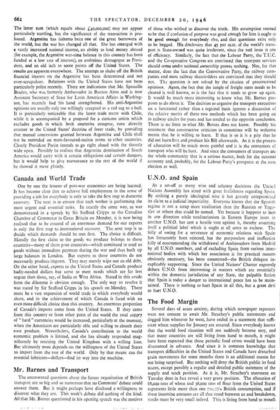Canada and World Trade
One by one the lessons of post-war economics are being learned. It has become clear that to achieve full employment in the sense of providing a job for everybody is only to take the first step to domestic recovery. The next is to ensure that each worker is performing the most urgent and essential tasks. In exactly the same way, as was demonstrated in a speech by Sir Stafford Cripps to the Canadian Chamber of Commerce in Great Britain on Monday, it is now being realised that to be assured of an enormous demand for our exports is only the first step to international recovery. The next step is to decide which demands should be met first. The choice is difficult. Morally the first claim to the goods we produce belongs to those countries—many of them poor countries—which continued to send us goods without immediate payment during the war and thus built up large balances in London. But exports to these countries do not necessarily produce imports. They may merely wipe out an old debt. On the other hand, exports to the United States and Canada produce badly-needed dollars but serve to meet needs which are far less urgent than those, say, of India or West Africa. Stated in this crude form the dilemma is obvious enough. The only way to resolve it was stated by Sir Stafford Cripps in his speech on Monday. There must be a vast expansion of world trade in which everybody would share, and in the achievement of which Canada is faced with an even more difficult choice than this country. An enormous proportion of Canada's imports come from the United States. If they came from this country or from other parts of the world the total supply of " hard " currencies would be increased, particularly at the moment, when the Americans are particularly able and willing to absorb their own produce. Nevertheless, Canada's contribution to the world economic problem is limited, and she has already responded mag- nificently by rescuing the United Kingdom with a willing loan. But ultimately most depends on the willingness of the United States to import from the rest of the world. Only by that means can the essential lubricant—dollars—find its way into the machine.


































 Previous page
Previous page